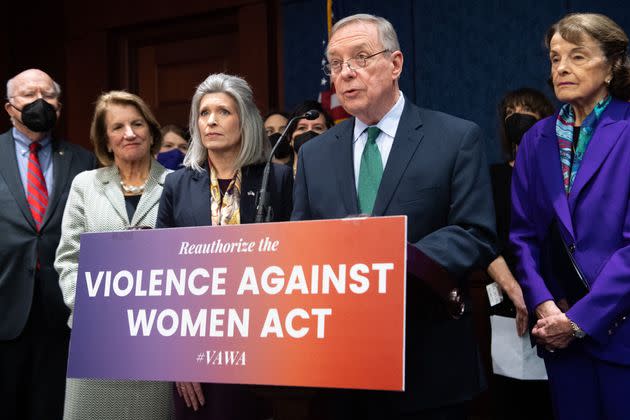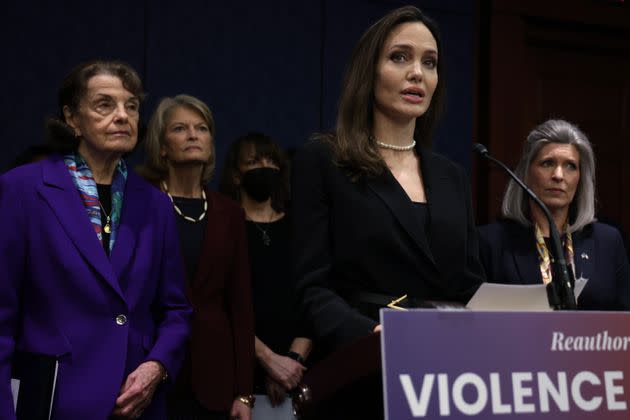Senators Unveil Bipartisan Bill To Renew The Violence Against Women Act
- Oops!Something went wrong.Please try again later.
- Oops!Something went wrong.Please try again later.
Senators introduced a bipartisan bill on Wednesday to reauthorize the Violence Against Women Act ― a victory unto itself given the lack of Republican support for previous bills, and a sign that Congress may finally have the will to renew the landmark 1994 law after its authorization expired three years ago.
The bill, which has been months if not years in the making, would reauthorize VAWA programs through 2027. It also includes new provisions like expanded access to forensic exams for victims of sexual assault in rural communities; a new grant program to provide community-specific services for LGBTQ survivors of domestic violence; and new jurisdiction to tribal courts to go after non-Native perpetrators of sexual assault, child abuse, stalking, sex trafficking and assaults on tribal law enforcement officers on tribal lands.
A copy of the 335-page bill is here.
It’s been an embarrassingly bumpy road for VAWA reauthorization in Congress. Once upon a time, this was legislation that passed unanimously in both chambers. How can you not support programs credited with stopping violence against women and saving people’s lives?
But the last time Congress reauthorized VAWA was in 2013, and that was only after an ugly partisan fight over adding new protections for Native American, LGBTQ and immigrant victims of domestic violence. That authorization lapsed in 2018, and, despite the House passing bipartisan bills to renew it, Senate Republicans simply wouldn’t unite on anything.
The result is that VAWA’s authorization has been expired since 2019. That doesn’t mean the law itself expired; it means there’s been uncertainty for its grant programs and no ability to update the law with new protections that domestic violence advocates say are badly needed.
The Senate bill unveiled Wednesday is a different story.
For starters, it has bipartisan co-sponsors: Sens. Dick Durbin (D-Ill.), Dianne Feinstein (D-Calif.), Lisa Murkowski (R-Alaska) and Joni Ernst (R-Iowa).
It also has other Republican cosponsors right out of the gate. They are Sens. Susan Collins (Maine), Shelley Moore Capito (W.Va.), Rob Portman (Ohio), John Cornyn (Texas), Kevin Cramer (N.D.), Thom Tillis (N.C.), Jerry Moran (Kansas) and, at the last minute, Richard Burr (N.C.).
That’s 10 GOP co-sponsors. Because of the Senate filibuster, it takes 60 votes to pass any bill, or 10 Republicans voting with all 50 Democrats. That means the newly introduced VAWA bill already has the votes to pass, presuming all Democrats vote for it.

VAWA is a priority for President Joe Biden. The 1994 law is one of his signature accomplishments. It was the first major federal legislative package focused on stopping violence against women, and it has since provided billions of dollars in grants for lifesaving programs. Rates of domestic violence declined by more than 50% between 1993 and 2008 after VAWA became law, per the Bureau of Justice Statistics.
“I am grateful that this critical bipartisan bill is moving forward,” Biden said of the VAWA bill in a Wednesday-night statement. “I look forward to Congress delivering it to my desk without delay.”
The Senate bill is similar to the version that passed the House in March 2021, but there is one big difference: The Senate bill doesn’t include a gun safety provision that would have prohibited people who have been convicted of abusing their dating partners from owning firearms, closing the so-called “boyfriend loophole.”
The gun provision was the biggest sticking point in the Senate, where most Republicans simply refused to support a VAWA bill that included any kind of restrictions on gun access. The National Rifle Association, among other gun rights groups, made it clear they opposed the provision.
Even Murkowski and Ernst tried to keep the gun language in the bill, along with Durbin and Feinstein, according to a Senate Democratic aide. But in the end, they didn’t have the GOP votes to pass the bill with the provision in it.
“It was a really difficult decision,” said this aide, who requested anonymity to speak freely about private conversations. “But it came down to we don’t want this to be a messaging bill. We want this to be a bill that can get to Biden’s desk.”
Durbin didn’t give any details on when the bill might start moving through the Judiciary Committee, which he chairs, and then onto the Senate floor.
“We’re perilously close to 60 votes,” he said.
He emphasized that every vote counts for passing VAWA and acknowledged the current absence of Sen. Ben Ray Lujan (D-N.M.), who had a stroke recently. Lujan is expected to return in four to six weeks.

Wednesday’s news conference was simultaneously celebratory and painful. Domestic violence prevention advocates described horrific abuse they faced in the past, before VAWA existed. Ernst reminded the room that she, too, is a survivor of domestic violence and that passing the bill is “very personal.”
Actor Angelina Jolie was among those who spoke tearfully about the need to pass the bill. She’s been surprisingly involved behind the scenes for months in trying to help build Republican support for VAWA.
“This is one of the most important votes you will cast this year in the Senate,” Jolie said, choking up. “Most of all, I want to acknowledge the children who are terrified and suffering at this moment, and the many people for whom this legislation comes too late.”
Democratic and Republican aides told HuffPost how impressed they were with Jolie’s help on VAWA. Celebrities often will float through Congress from time to time to urge action on issues they care about, but in Jolie’s case, she did more than just show her face.
“There was a Republican cosponsor she helped get on the bill,” said one aide, who wouldn’t say who that senator was. “She has been phenomenal.”
This story has been updated to include the additional GOP co-sponsor of the VAWA bill and comments from Biden.
This article originally appeared on HuffPost and has been updated.
